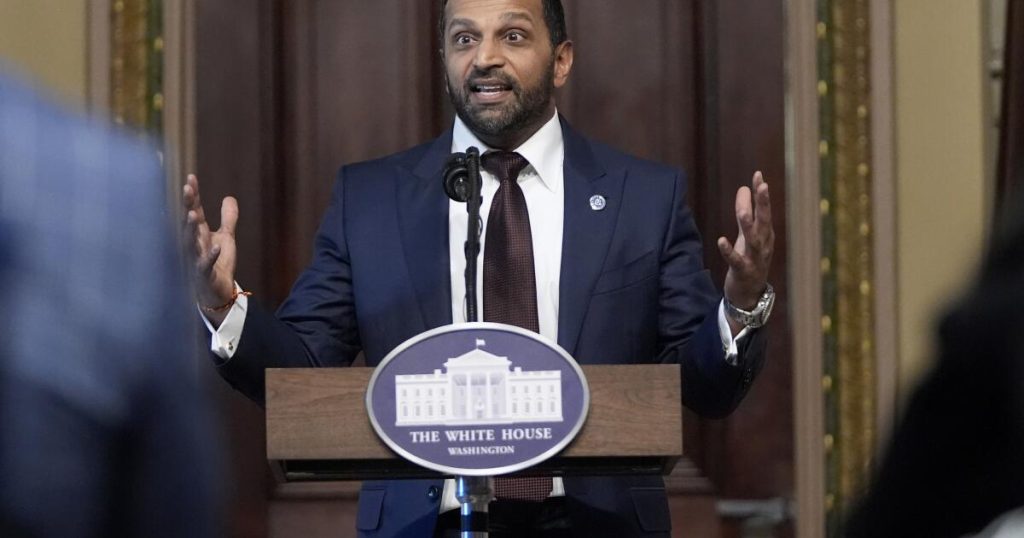Kash Patel to Lead Both FBI and ATF in Unprecedented Move, Sparking Controversy
In a surprising and unconventional move, Kash Patel, the newly appointed director of the Federal Bureau of Investigation (FBI), is expected to take on an additional role as the interim head of the Bureau of Alcohol, Tobacco, Firearms and Explosives (ATF). According to a Justice Department official, Patel could assume this dual responsibility as early as next week. This arrangement, which has raised eyebrows in Washington, places Patel at the helm of two of the largest and most influential agencies within the Department of Justice. The news, first reported by ABC News, comes at a time when the ATF has been a focal point of criticism, particularly from conservative circles, who have long been skeptical of the agency’s role in regulating firearms.
Patel’s appointment as FBI director was confirmed by the Senate just last week, despite concerns from Democrats about his plans to overhaul the agency. A staunch ally of former President Donald Trump, Patel has been a polarizing figure, with critics questioning his qualifications and potential bias. Now, with the addition of the ATF to his portfolio, Patel will oversee an agency responsible for enforcing federal laws related to firearms, explosives, and arson. The ATF, which employs approximately 5,500 people, plays a crucial role in licensing federal firearms dealers, tracing guns used in crimes, and investigating arson and explosives cases. The decision to have one individual lead both the FBI and the ATF has sparked questions about the future of the ATF and whether this dual leadership structure is a step toward consolidating power or possibly even dismantling the agency altogether.
The news of Patel’s potential dual role comes on the heels of another significant development within the ATF. Earlier this week, Attorney General Pam Bondi fired the agency’s chief lawyer, Pamela Hicks, citing concerns that the ATF was “targeting gun owners.” Hicks, a veteran of the Justice Department with over 20 years of service, expressed her disappointment publicly, calling her time at the ATF the “greatest honor” of her career. This leadership shakeup has only added to the uncertainty surrounding the agency’s direction under Patel. Conservatives have long been critical of the ATF, accusing it of overstepping its authority, particularly in its regulation of firearms. Some have even called for the agency to be abolished entirely.
Under the Biden administration, the ATF had taken steps to implement new regulations aimed at curbing unregistered firearms and expanding background checks for gun buyers at firearms shows and other venues outside of traditional retail stores. However, with the change in administration, the tone in Washington has shifted dramatically. In an executive order issued earlier this month, President Trump directed Attorney General Bondi to review all actions taken by the Biden administration on firearms, with the goal of identifying any ongoing infringements on Second Amendment rights. This order has been interpreted by many as a sign that the new administration intends to roll back many of the firearm regulations enacted by its predecessor.
The decision to place Patel at the helm of both the FBI and the ATF has been met with starkly different reactions from opposing groups. Gun control advocates have expressed alarm, with the Brady Center to Prevent Gun Violence describing Patel as a “known extremist on gun rights.” Meanwhile, groups like Gun Owners of America have praised the move, calling Patel’s confirmation as FBI director “a huge win for gun owners and constitutional rights advocates across the country.” These sharply contrasting views highlight the deep polarization surrounding firearms policy in the United States.
As Patel prepares to take on this unprecedented dual role, questions remain about how he will manage the responsibilities of leading two major agencies. The ATF, in particular, has faced significant challenges in recent years, including political battles over its budget and mandate. The last confirmed ATF director, Steve Dettelbach, stepped down just last month after leading the agency since July 2022. His confirmation had been a rare achievement, as the ATF had gone without a Senate-confirmed director for nearly a decade due to the politically charged nature of the position. Now, with Patel at the helm, many are left wondering what the future holds for the ATF and whether this unusual arrangement signals a broader shift in how the federal government approaches firearms regulation.
